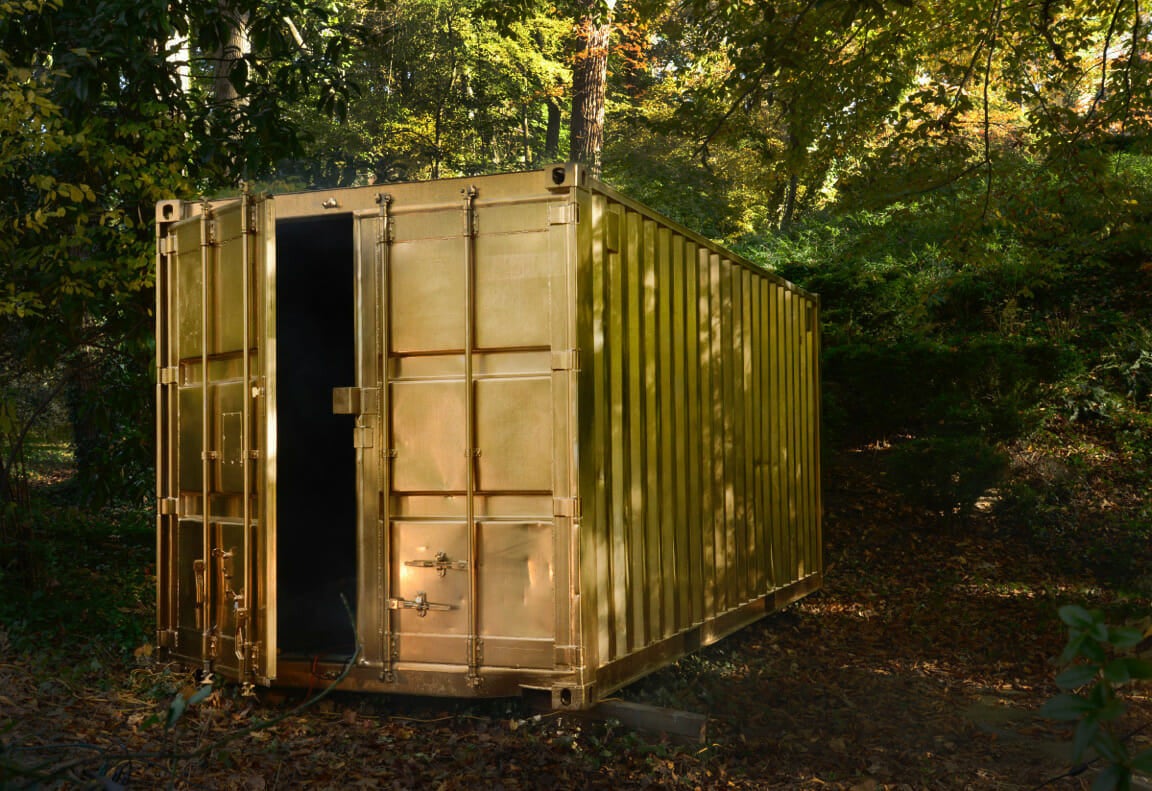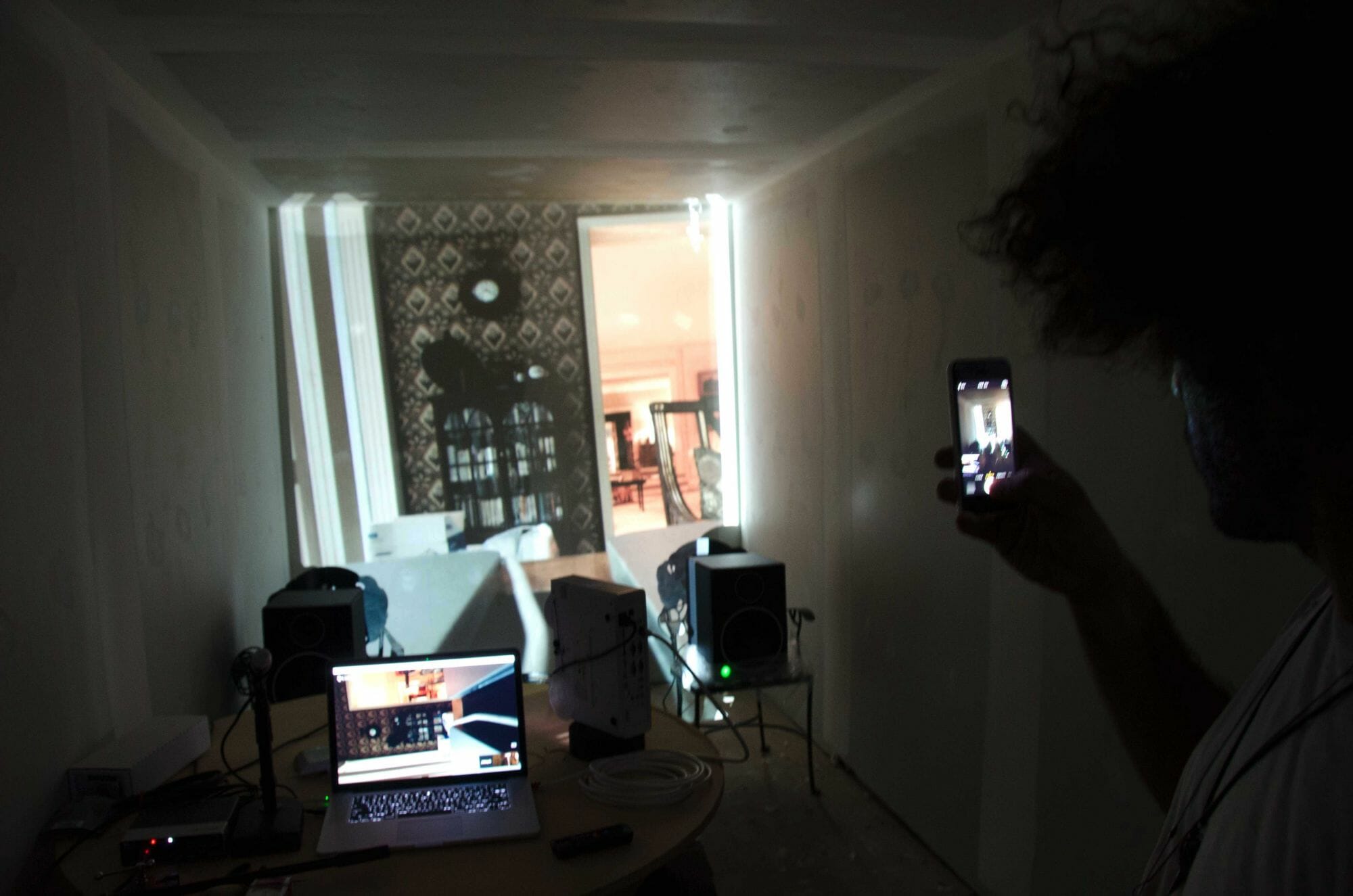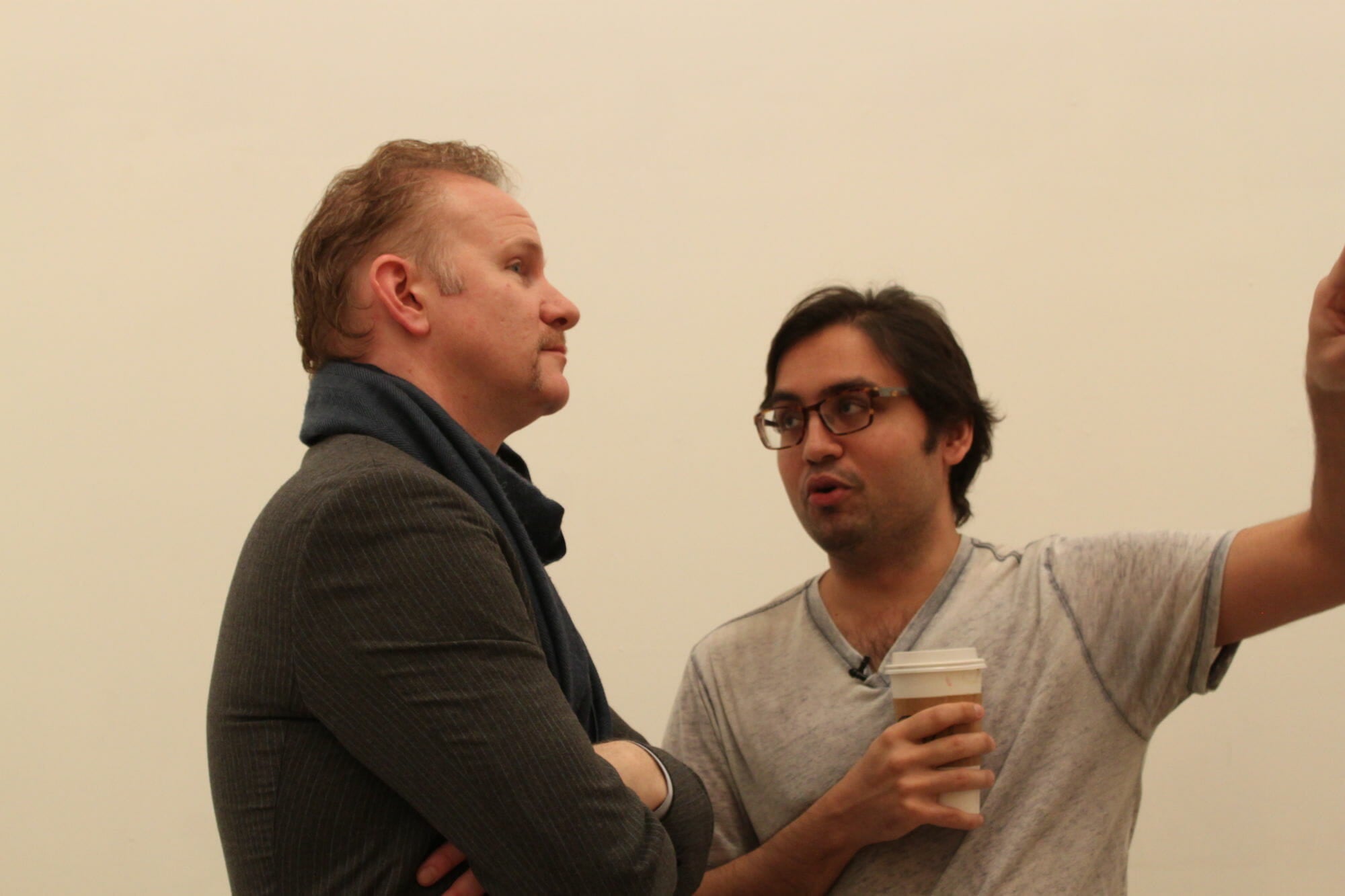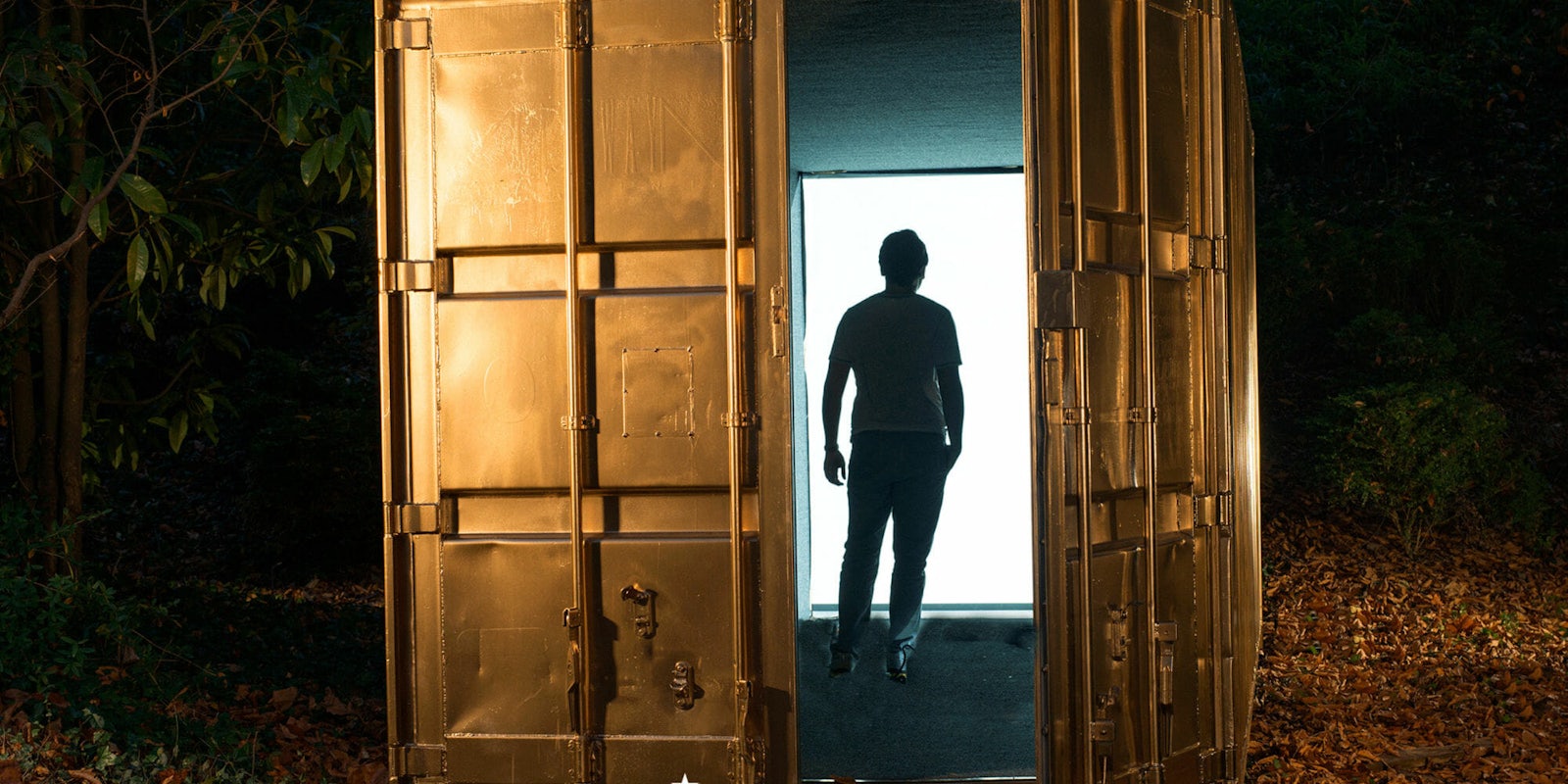Four months ago, inside a gold-painted shipping container on the Georgetown University campus, Beth Flores stood face-to-face with someone 7,000 miles away.
That someone was Omid Habibi, an associate professor of computer science at Herat University. Habibi stood inside a nearly identical shipping container in Herat, a city of over 400,000 people in western Afghanistan. Through the magic of consumer-grade technology—a broadband Internet connection, a camera and microphone, and a screen that projected each to the other at life size—Flores and Habibi were able to talk, uninterrupted, for 20 minutes, as if they were standing together in the same room.
It was an especially poignant encounter for Flores, who previously worked as a civilian with the Department of Defense in Herat.
“I was really moved at how easy it was to make this connection with a person in a country that I had been in under terribly different circumstances 10 years before,” Flores recalls. “In the four months I was there, I never had a connection with an Afghan citizen that was close to as powerful, as moving, as I did standing in that gold box. I was moved almost to tears. I was reminded why I got into the field of international affairs a thousand years ago: to understand people in other parts of the world, and how they thrive and survive under challenging circumstance. I was reconnected to that thread of my life.”
This is Portals, an art installation pioneered by Amar Bakshi, a Yale law graduate and former special assistant to the U.S. ambassador to the United Nations who’s worked with both CNN and the Washington Post. Think of it as a jumbo-sized Chatroulette, stripped of the skeeviness and imbued with a purpose.
Here’s how it works: Two shipping containers are placed in locations thousands of miles apart, painted gold, and equipped with videoconferencing equipment that allows their inhabitants to communicate. Participants sign up for 20-minute slots, step inside the Portal, and are connected to a stranger on the other side of the world. Then they’re given a simple prompt (“What would make today a good day for you?”) that they can use as a starting point. The resulting international conversations are private, unfilmed, and purposefully without purpose. The two individuals on either side of the Portal may discuss politics, art, relationships, education, family, neighborhoods, or in some cases, nothing in particular at all.
Portals debuted in New York City but came to Washington, D.C., this spring, appearing first at Georgetown University and then, after a successful Kickstarter campaign, to Woodrow Wilson Plaza, mere blocks from the United States Capitol. For more than two weeks in June, hundreds of people used the Portal to connect to citizens in similar Portals in Havana, Cuba; Herat, Afghanistan; and Tehran, Iran.
It’s an idea that came to Bakshi during his days with the Washington Post.
“When I left journalism, I missed the conversations I had when the camera is off, when I was meeting someone I wouldn’t have talked to otherwise, and I had the freedom to ask whatever I wanted,” says Bakshi, who’s also the founder of Shared_Studios, the Washington, D.C.–based art collective responsible for the project. “I discovered that some of the most important conversations were ones I had with a stranger, during a bus ride from one place to another. When there was no iPhone, nothing to look at, just to pass the time. I had some of the deepest moments of my life at that time.”

Bakshi wasn’t the only former journalist whose experiences inspired Portals. Shared_Studios’ director of global development, Michelle Moghtader, is the logistics master charged with managing to make Portals work even in places like Havana, where finding stable Wi-Fi can be a Sisyphean task. She worked for a time as the Iran correspondent for Reuters, where she often observed an appetite for stories that the regular news cycle had little time for.
“As a journalist, I was writing on Iran every single day. And everyone in the news sphere was focused on just a few issues regarding Iran, but there were a myriad of other stories to tell. I just didn’t have the bandwidth to do it,” says Moghtader. “People would ask me ‘What’s the art scene like? What’s the dating scene like? What do people do for fun?’”
While Portals offers an exceedingly intimate, small-scale way for those stories to be told, Bakshi stresses that that’s not necessarily the project’s true intent. Instead, Portals offers its participants the opportunity to have the kind of quiet, directionless, unplanned interaction between people that’s become unusual in modern life—even in dense, diverse, bustling cities like Washington, D.C. Participants in Portals are free to use or disregard Bakshi’s prompt, and the 20 minutes is a long enough period of time that conversations necessarily progress past small talk.
“No one ever comes out early, and people always wish they had more time,” Bakshi says.
In a sense, that careful amorphousness is what distinguishes Portals. After all, the technology powering the project is consumer-grade; it’s essentially the same Skype or FaceTime or Google Hangouts that you have on your phone, except on steroids. But we use Skype and other communication apps to network, to shop, to look for love, or to catch up with those we already know. Portals uses the same technology to generate, on a global scale, the kind of personal encounters that many no longer experience much of in their day-to-day lives.
“There’s a kind of encounter that’s increasingly rare, and that’s what I call a de-instrumentalized encounter. It’s an encounter without a preset purpose.” … “When you look at a painting you don’t look at it to get a job or necessarily or hopefully just to buy it or size up its worth. It is purposeless, right?” … “Portals is meant to do exactly that, but with a human being in the other space.”
“There are fewer and fewer times when we allow ourselves to meet a stranger for no particular purpose, to engage someone out of a basic human curiosity.”
Perhaps that’s why the shipping container makes such an ideal vessel for Portals. The container is simultaneously an international symbol of globalization and a blank slate. They can be found nearly anywhere in the world, and most of their meaning derives from whatever fills them. Just as importantly, Baskhi says, they boast numerous practical strengths, chief among them that they’re cheap, sturdy, and secure.

Paradoxically, though, they’re kind of expensive to ship.
“One other big thing we learned with shipping containers is they’re incredibly expensive to move,” Bakshi says. “I thought, ‘Oh, shipping container, we can just ship it anywhere.’”
“We need a ship!” interjects Moghtader.
“I thought it’d be really cool to have a shipping container on a truck, or a shipping container on a barge, and that is cool, but we lose so much on moving the thing around,” says Bakshi. “… I really thought that the cost of shipping containers was going to be low. That was my whole central premise. It was a rude awakening to realize that shipping it in one direction was more expensive than buying the whole thing.”
Indeed, there are ample costs associated with setting up Portals, despite the relatively basic technology and contracting skills required. Portals relies on having staff on both ends of the Portal—people to book appointments, troubleshoot Internet problems, translate, and coordinate the considerable logistics. Bakshi and Moghtader are working toward building a crowdfunding platform that would allow communities to raise the money to build, connect, and staff their own Portals, which could then plug into the network and connect with other Portals anywhere in the world. Bakshi is particularly eager to establish a Portal in Zaatari, a refugee camp in Jordan that’s home to more than 75,000 displaced Syrians. Crowdfunding could not only establish a Portal in Zaatari, but also pay locals to translate, creating sorely needed economic opportunity.

Ultimately, Shared_Studios envisions a network of Portals thousands strong, so participants in Detroit could connect to Mexico City, who could in turn connect to Karachi, Pakistan, who could then connect to Beijing. The applications for such a network are nearly limitless. Already in its brief run at the Woodrow Wilson Plaza, the Portal hosted reunions between family members in the United States and Cuba, a meet-and-greet between classrooms in Washington, D.C., and Tehran, and even a performance from a band in Tehran for an audience in America.
While Portals may expand far beyond D.C., the nation’s capital remains in many ways, the perfect fit for the project.
“It’s a city where people know about every country in the world. It’s a very well-read, educated city, but people don’t necessarily get the chance to truly interact with the people who live in the countries they’re creating policies for,” Moghtader says. “Here’s a chance where, in a small way, you can go in and speak to someone and learn how that policy affected people on the ground.”
That’s a thought echoed by Beth Flores. Today, Flores works for Impact Hub D.C., one in an international network of co-working spaces and business incubators that hosts an array of startups, nonprofits, and advocacy groups. It’s not hard for her to imagine the kind of benefits that Portals might bring to folks in exactly the position she was 10 years ago—people who don’t often get the chance to come quietly face-to-face with those their policies may affect.
“In Afghanistan, when I was there, everything was deliberate. Everything was planned. Not everything went as planned, for sure, but everything was so deliberate. To have had the chance to step into a Portal and have a kind of connection like that, frankly, would have helped me to understand the place and the people,” Flores says. “Then I think about it at scale… What if the people who were planning or devising the strategies for our foreign policy had these kind of connections with the humans on the other side of the planet? I think that could be really profound.”
This Daily Dot article was made possible by Heineken. The City Kickstarts editorial series has no formal relationship with Kickstarter. The project featured, PORTALS, is independent and is in no way affiliated with or funded by Heineken or the Daily Dot.



